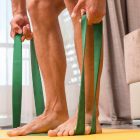Synopsis
Back pain remains one of the most common and debilitating health conditions across all age groups, impacting work-life, mobility, and emotional well-being. This blog unpacks how physiotherapy for back pain is more than just symptomatic relief—it’s a path toward complete spinal health. It highlights how personalised back pain physical therapy treatment can reduce stiffness, enhance flexibility, and reverse muscle imbalances. With advancements in bad back physio strategies, individuals now have the power to combat chronic pain without invasive procedures. For those dealing with discomfort post-injury or surgery, physiotherapy after surgery is a safe and effective recovery tool. The blog also details how physio for sore back routines can prevent future injury by strengthening key muscle groups. By including backache physiotherapy, it provides a thorough understanding of how therapy addresses poor posture, weak cores, and sedentary habits. Whether you’re seeking preventive care or structured rehabilitation, this guide offers a clear roadmap to living free from pain.
Table of Contents
- Introduction to Back Pain and its Causes
- Why Physiotherapy is the First Line of Treatment
- Bad Back Physio – Correcting Chronic Issues
- Understanding Physio for Sore Back Relief
- Role of Physiotherapy After Surgery
- Backache Physiotherapy for Posture & Lifestyle Correction
- Integrating Therapy with Long-Term Lifestyle Changes
- Why Orthocure is Your Ideal Wellness Partner
Introduction to Back Pain and its Causes
Back pain can originate from a multitude of factors—poor posture, sedentary work life, sports injuries, degenerative changes, or post-operative complications. It often begins as mild discomfort but can escalate into chronic, lifestyle-altering pain. Whether the discomfort stems from the cervical, thoracic, or lumbar region, addressing it early with physiotherapy for back pain ensures faster recovery and fewer long-term complications. Unlike temporary painkillers, physiotherapy provides sustainable relief by addressing root causes like muscle tightness, joint dysfunction, and spinal misalignment.
Why Physiotherapy is the First Line of Treatment
Physiotherapy offers a non-invasive, highly effective approach to managing and reversing back pain. Customised back pain physical therapy treatment focuses on pain reduction, muscle strengthening, and spine mobility restoration. Treatment often begins with a clinical assessment, identifying muscular imbalances and mobility restrictions. Techniques such as deep tissue mobilisation, stretching, strengthening, and electrotherapy form a core part of the plan. The objective is not just to treat pain, but to improve posture, support spinal structures, and educate patients on ergonomics and movement awareness.
Bad Back Physio – Correcting Chronic Issues
A bad back physio programme is specifically tailored for those who suffer from recurring lower back or spinal pain. It includes core strengthening, lumbar stabilisation, pelvic alignment, and spinal mobilisation. By correcting deep-rooted musculoskeletal patterns, this therapy reconditions the body for pain-free movement. For individuals over 30, muscle mass begins to decrease and postural deficiencies set in—bad back physiotherapy ensures these do not develop into long-term spinal issues. Structured exercises under supervision not only help alleviate pain but also enhance balance, coordination, and core endurance.
Understanding Physio for Sore Back Relief
Experiencing muscle soreness after long hours of sitting or strenuous activity? Physio for sore back focuses on relieving muscular tension, restoring flexibility, and activating underused muscle groups. Sessions may include heat therapy, myofascial release, and tailored movement training to soothe sore muscles and reduce inflammation. Regular sessions help in muscle re-education and prevent the recurrence of pain. This approach is particularly effective for those who engage in long desk hours, athletes recovering from overuse, or elderly individuals facing age-related musculoskeletal fatigue.
Role of Physiotherapy After Surgery
Post-surgical rehabilitation is an essential component of recovery. Physiotherapy after surgery helps patients regain mobility, reduce scar tissue formation, and accelerate healing. Whether you’ve undergone spinal surgery, disc replacement, or minimally invasive procedures, timely physiotherapy prevents muscle stiffness, atrophy, and incorrect movement patterns. Controlled exercises ensure tissues heal correctly while building the strength needed to resume daily activities. The combination of manual therapy and progressive strengthening techniques prepares the body to regain full functionality with minimal risk of re-injury.
Backache Physiotherapy for Posture & Lifestyle Correction
Today’s lifestyle has made backache a common ailment among students, working professionals, and homemakers. Backache physiotherapy addresses the impact of poor posture, weak abdominal muscles, and lack of core control. It emphasises daily posture correction, functional movement drills, and ergonomic awareness. This approach helps undo years of strain caused by repetitive motions or sedentary habits. As backaches can also stem from emotional stress, holistic physiotherapy also integrates breathing and relaxation techniques to manage psychosomatic triggers effectively.
Integrating Therapy with Long-Term Lifestyle Changes
While physiotherapy offers short-term relief, long-term recovery depends on consistency and lifestyle changes. Patients are advised to maintain regular movement, practice stretches at home, and follow ergonomic habits at work and home. The key is to blend physiotherapy for back pain sessions with self-care strategies such as correct mattress selection, active sitting habits, and strengthening workouts. With the right discipline, therapy not only heals pain but prevents its recurrence entirely. It empowers patients to take control of their spine health across decades.
Why Orthocure is Your Ideal Wellness Partner
At Orthocure Clinics and Gyms, physiotherapy is more than treatment—it is personalised healthcare. Our sessions are guided by licensed physiotherapists and powered by cutting-edge MedX machines, offering back pain physical therapy treatment that is precise and safe. Our programmes suit every age group but especially those above 30 or recovering from surgery. With bad back physio and backache physiotherapy services that cater to sedentary professionals, seniors, and athletes alike, we build fitness routines that support your health journey. Our centres are designed to ensure comfort, clinical precision, and long-term care through efficient 40-minute sessions.
FAQs
What are the benefits of physiotherapy for back pain?
Physiotherapy helps relieve pain, restore mobility, and strengthen muscles that support your spine. It improves posture and teaches patients how to manage their condition long-term. Using a combination of manual therapy and targeted exercises, physiotherapy can reduce dependency on medication and lower the chances of recurrence. It is especially beneficial for patients recovering from spinal injuries or surgery. Early intervention through physiotherapy often prevents chronic issues from developing.
How does bad back physio work for chronic pain?
Bad back physio focuses on identifying weak muscles and correcting movement patterns that strain the lower back. It involves stretching, strengthening, and mobilisation exercises that improve core stability and spinal alignment. Therapists guide patients through gradual, safe exercises tailored to their condition. The aim is not just to relieve pain but to retrain muscles for optimal function. Over time, this approach can completely reverse chronic symptoms.
Can physiotherapy after surgery speed up recovery?
Yes, physiotherapy after surgery plays a vital role in post-operative recovery. It helps restore flexibility, rebuild strength, and improve balance. Techniques like soft tissue mobilisation, electrotherapy, and guided movements help reduce scar tissue formation. A structured plan ensures the surgical area heals correctly while avoiding stiffness and compensatory pain. This speeds up the return to normal daily activities safely.
Is physio for sore back effective without medication?
Physio for sore back can be highly effective without needing medication. By addressing muscular imbalances and improving blood flow, therapy helps reduce inflammation naturally. It restores flexibility and promotes spinal alignment, leading to pain relief. Many patients report better long-term outcomes from physiotherapy than from short-term painkillers. Regular sessions with lifestyle changes can eliminate the need for drugs entirely.
What does backache physiotherapy include?
Backache physiotherapy includes posture correction, core strengthening, spinal mobility exercises, and ergonomic education. It addresses lifestyle factors like prolonged sitting, poor posture, and lack of physical activity. Therapists also focus on breathing techniques and stress management to treat psychosomatic components of back pain. Personalised exercise plans are designed after a thorough assessment, ensuring that therapy is both safe and effective. This holistic approach leads to lasting relief.





